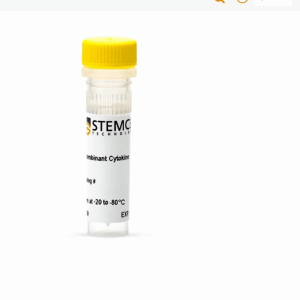Activin A is a member of the transforming growth factor beta (TGF-β) family of proteins produced by many cell types throughout development (Gurdon et al.). It is a disulfide-linked homodimer (two beta-A chains) that binds to heteromeric complexes of a type I (Act RI-A and Act RI-B) and a type II (Act RII-A and Act RII-B) serine-threonine kinase receptor (Attisano et al.). Activins primarily signal through SMAD2/3 proteins to regulate a variety of functions, including cell proliferation, differentiation, wound healing, apoptosis, and metabolism (McDowell et al.). Activin A maintains the undifferentiated state of human embryonic stem cells (James et al.; Xiao et al.) and also facilitates differentiation of human embryonic stem cells into definitive endoderm (D’Amour et al.).

